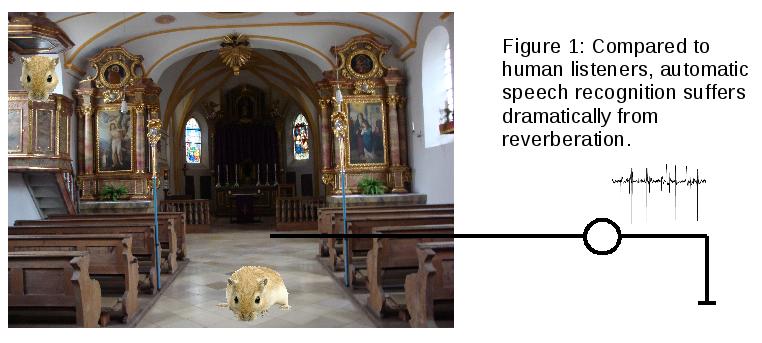Project B3 – Auditory invariance against space-induced reverberation
Space-induced reverberation can dramatically impair critical temporal features of speech, as exemplified when listening to a sermon in a large church. Automatic speech recognition falls far short of human performance in reverberant environments, as our auditory system creates a representation of acoustic stimuli that is to some extent invariant against space-induced reverberation. A recent study has indicated that inhibitory circuits in the auditory brainstem suppress s patial information in reverberation [1], and pilot experiments have revealed that a well-established animal model of human hearing, the Mongolian gerbil shows human-like perceptual suppression of spatial information in reverberation [2].
Objectives and description of the project
We will explore how our auditory system compensates for room-induced reverberation by reconstructing the original temporal structure of sound [3]. Using a combination of psychophysics, electrophysiology and modeling, we will measure how compensating for reverberations improves perceptual performance and seek the neural substrate for the auditory compensation of re verberation in the gerbil. In the psychophysical experiments, gerbils will be trained to classify temporally structured target sounds (designed in collaboration with position PC) in the presence of varying degrees of reverberating ambient sounds. Electrophysiological recordings will be obtained both from the auditory midbrain of untrained animals in standard in-vivo experiments, and from trained, awake, and behaving animals with chronically implanted tetrode microdrives. Based on the experimental findings, we will extend existing circuit models [1], adding facultative components under cognitive control, to quantitatively explain the psychophysical and electrophysiological data. The goal of this project is to understand the mechanism by which midbrain circuits create an invariant representation of acoustic stimuli that have been degraded through reverberation.
verberation in the gerbil. In the psychophysical experiments, gerbils will be trained to classify temporally structured target sounds (designed in collaboration with position PC) in the presence of varying degrees of reverberating ambient sounds. Electrophysiological recordings will be obtained both from the auditory midbrain of untrained animals in standard in-vivo experiments, and from trained, awake, and behaving animals with chronically implanted tetrode microdrives. Based on the experimental findings, we will extend existing circuit models [1], adding facultative components under cognitive control, to quantitatively explain the psychophysical and electrophysiological data. The goal of this project is to understand the mechanism by which midbrain circuits create an invariant representation of acoustic stimuli that have been degraded through reverberation.
[1]: Pecka et al. J Neurosci 2007. [2]: Wolf et al. J Comp Physiol submitted. [3]: Watkins, J Acoust Soc Am 2005.

